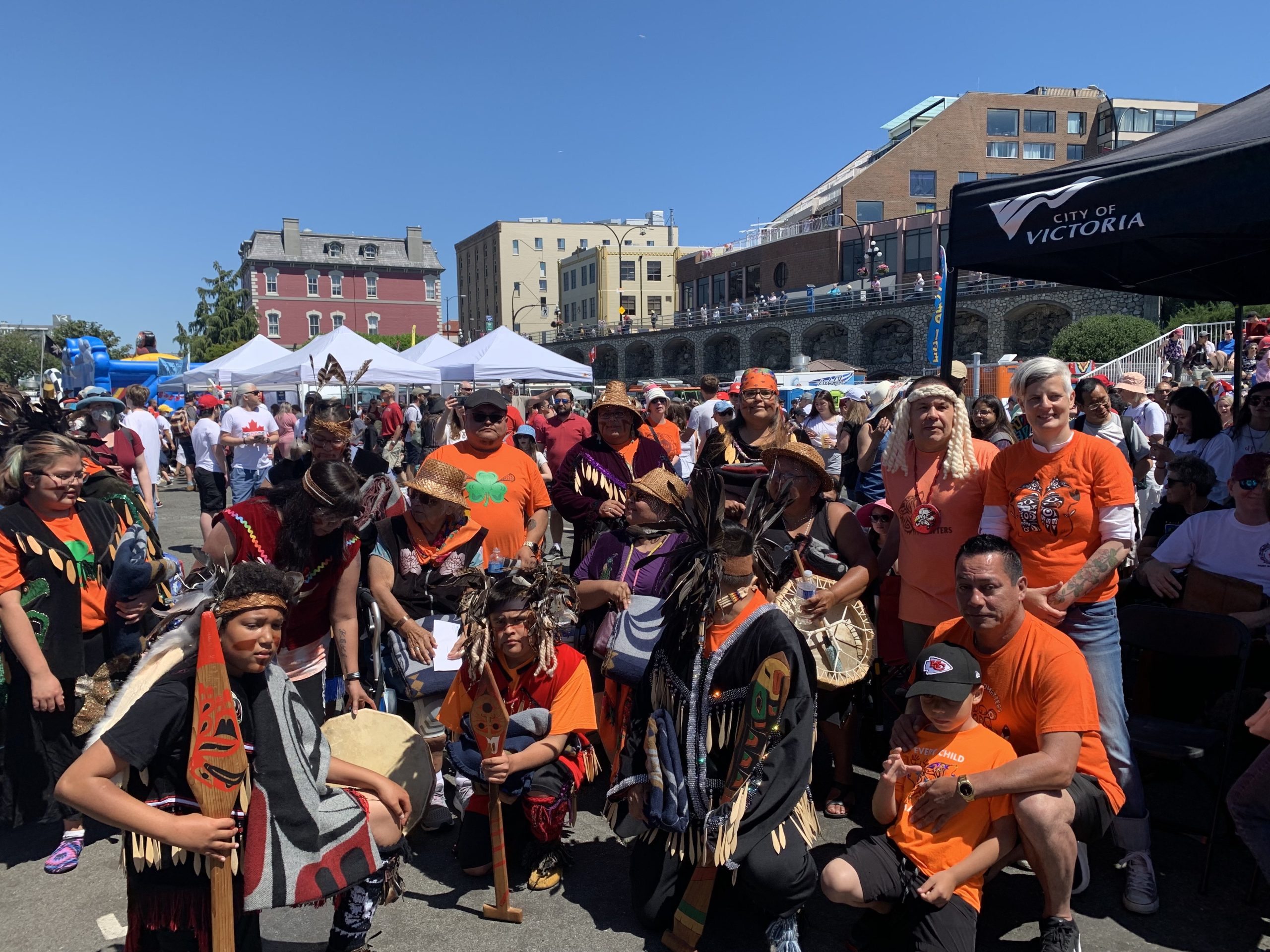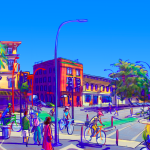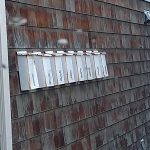
WARNING: This post contains details some readers may find distressing.
When I stood up in the canoe on July 1st in Victoria’s inner harbour to ask permission of the Lekwungen speaking people to come ashore, I was participating in a tradition that is thousands of years old. As we got closer to protocol corner at Belleville and Government Streets where members of the Songhees and Esquimalt nations were waiting, and as we began to sing, I was overcome with emotion.
After the uncovering of the graves last summer at the Kamloops Indian Residential School – just a little over a month before we were supposed to celebrate Canada – it didn’t feel right to hold Canada Day events, so we cancelled our plans. We wanted to honour the grief and pain of residential school survivors, elders and everyone across the land who was feeling shock or anger, despair or shame. Last summer was a time for many strong feelings, but it definitely wasn’t a time to celebrate.
In a thoughtful article, “‘We can’t be blind to our own history’: Discovery of graves triggered Canada’s year of reckoning,” Dirk Meissner cites Royal Roads professor Geoff Bird. Bird says, “The discovery of children buried in residential schools across the country was perhaps the most traumatic event in recent Canadian history in terms of defining who we are. When you actually have a discovery such as this, it can’t do anything but impact the nation and its perception of itself … The whole field of cultural memory is what we remember, what we forget, what we silence. We can’t be blind to our own history.”
As non-Indigenous people – and in particular those of us with privilege – we have been blind to our own history. It’s been easy for us to do so because we weren’t negatively impacted by it. In fact, we directly benefited as Indigenous people were removed from their homes to make way for our homes, and our businesses and government institutions.
The more I learn about our collective history, the more deeply immersed in the work of reconciliation I become, and the closer the relationships I develop with the Lekwungen people, the less theoretical and the more real colonization and its painful and lasting legacy becomes.
I’ve been thinking: What would it be like if someone came into our home as a guest, offered us a small amount of money for rent while also assuring us that that we could all live together here, that we’d be able to continue to live in the way we always had. But then they then kicked us out, told us we couldn’t live here anymore, and moved us away. What would it feel like to watch from afar as our house was knocked down, to be so disrespected, our gardens destroyed, nothing left that we recognized.
What if they also destroyed our grocery stores, all our familiar foods, leaving us only with food that is unhealthy for us and makes us sick.
What if every September, they came and took our kids and, if we refused, sent the police to take them. What if we didn’t know where our kids were going? What if our kid got sick or died or was beaten or sexually abused? What if we never saw them again? Our hearts would break. We would go mad with grief and anger.
What if when those first unmarked graves were discovered we knew in our hearts that in one of those graves lay the bones of our kid?
These are the realities of Indigenous people in Canada. This is Canadian history.
So after a year of reckoning – and likely many more to come – we knew that we needed to do something differently on July 1st this year. We began by talking with the Songhees and Esquimalt chiefs and councils to seek their input and guidance. We determined together that the day should begin with, and be grounded in, Lekwungen tradition.
What struck me throughout the process of planning the July 1st events with the Songhees and Esquimalt nations – and what continuously touches me – is their utter generosity despite everything that has happened.
They shared with us the importance of us asking permission to come ashore to hold the festivities: we were honouring them and not taking their land or our welcome on it for granted. They told us the name of one of their canoes, and what the name means. They told us that when we are out on the water, paddling together, that when our paddles move together, we are moving with one heart and one mind.
They let us know that we needed to sing a song when we got close to the shore, and that we’d be greeted with a song. They shared with us about the need to stand up in the canoe when requesting permission, with our paddles facing upward, and they guided us about the words that we should use to ask permission in the right way to make sure that we were honouring the lands and both nations.
This is Canadian history. That these customs, traditions, songs and language still exist despite the cultural genocide on which our country was founded, is a manifestation of the courage, resilience, tenacity and love of the Lekwungen people.

Once we got out of the canoes, we were drummed through the crowd along the inner causeway to the stage for the opening ceremony with young members of the the Lekwungen Traditional Dancers leading the way. The opening ceremony began with a moment of silence to recognize that for some, July 1st is a day of grief, hurt, pain and anger. The moment of silence was contrasted at the end of the day with fireworks, where members of the Songhees and Esquimalt Nations and their families were our special guests.
July 1st in Victoria this year was about holding and honouring all the complex truths of the day and experiences of life in this country. In one hand we held the pain and grief and anger. And in the other, a need to come together as a whole community and celebrate Canada. The sea of red and white and orange downtown that day was a powerful symbol that multiple truths and experiences can live peacefully side by side. Indeed this is exactly what is necessary for our collective future.
To see some video from the event, check out Global News’ excellent and thoughtful coverage here.
A national Indian Residential School Crisis Line has been set up to provide support for former students and those affected. People can access emotional and crisis referral services by calling the 24-hour national crisis line: 1-866-925-4419.





